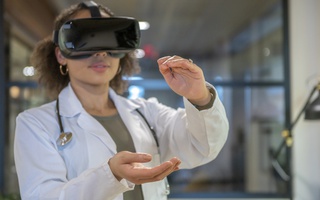Digital transformation penetrates all fields of our life, and healthcare services could not remain untouched. Electronic medical records, electronic recipes, and electronic sick lists are no longer something exotic — they are the services of private clinics that patients expect to get.
Technologies in medicine
Recently a new medical technology appeared and became widely discussed. Virtual councils of doctors, second-opinion systems, online patient management, results of analyses, and email recipes became officially recognized. In essence, the recently adopted law on telemedicine entrenched the distance healthcare practices powered by modern technologies. Now the implementation of such project involves determined effort on building reliable communication channels, identifying doctors and patients, and providing reliable protection of personal data. With today’s portable devices you can send various health data to your doctor. Telemedicine, as well as other modern medical technologies, provides another powerful stimulus for the development of modern technologies in this industry.
The technological leap also impacts the return on business investment. New healthcare technologies can often dramatically reduce the prime cost of some services. One of such examples is online consulting with doctors: while the upfront costs are very low, the added value of the service is increased by many times.
All modern technologies related to the digital transformation of healthcare imply maximum automation of routine workflows to save the precious time of doctors. As a result, the throughput of admissions units in clinics increases.
Private clinics were the first to learn to collect the short-received profit and keep their fingers on the pulse of technological innovations in healthcare.
Searching for optimal solutions
However, if you want to apply new technologies in medicine, you need to assess your capabilities in every detail. That is why all such projects should be started with an infrastructure audit. It will help you to configure an optimal solution meeting the unique requirements of the client’s production processes. At the next stage, the implementation engineers and project managers start their work. The project team can include 3 members or 30 members, depending on the project scale. This is an important aspect that impacts the project cost and implementation success. Remember that preparing the physical infrastructure required to implement new healthcare technologies also demands special attention and impacts the final project cost.
At the present time, Russian companies are lagging a bit behind their European counterparts in terms of using new technologies in medicine. The telemedicine technologies are only becoming a part of our lives, and their implementation is often impeded by controversial legislative acts. These controversial laws and red tape are the main headwinds holding back the development of all new technologies. Telemedicine has long since become commonplace abroad — and this refers to many fields of healthcare.
Recent foreign developments
I would like to list some milestone events that exemplify the development of new technologies in medicine. I think that they can initiate a new breakthrough:
- In the beginning of 2018, a report named “Artificial Intelligence in the national healthcare system of the UK” was published. This study draws attention to the applications of AI in healthcare. AI in medicine is considered a contributor to the development of the national healthcare system. According to the report, it can be used to increase the overall healthcare efficiency. AI can also drive cost reduction. This echnology has a broad range of applications. Among other things, AI in medicine can be used as a decision making advisor, helping doctors increase the effectiveness of diagnostics, or as a smart virtual assistant that helps with more precise planning.
- US Food and Drug Administration has granted a US marketing authorization for the neural network-based decision making assistant for healthcare applications. The system developer claimed that the system can detect the signs of blood stroke at early stages based on the MRI data. These new medical technologies are not only able to process the MRI images but are also integrated with the notification system of the neurovascular centers. Their specialists are notified immediately after the MRI survey that detects the early signs of blood stroke.
New technologies in medicine: Russian experience
Of course, there are some pitfalls in the development and implementation of novel medical technologies in Russia. In my opinion, we do not have any research problems: there is a lot of high-skilled specialists in technological transformation of medicine in our country. Some developments are very noteworthy, they are ready for practical implementation to improve the quality of Russian healthcare and fulfill the import substitution plan at the same time. Nevertheless, the vast majority of such initiatives comes to nothing when the developers are unable to obtain the marketing authorization due to many bureaucratic obstacles. Unfortunately, it is not as quick and easy, as we would like it to be. But time waits for no one: similar innovative developments are imported from foreign countries.
I would also like to note that Russian researchers try not to stay behind their Western colleagues and actively adopt their practices. Of course, the most advanced regions in terms of healthcare are Moscow and Saint Petersburg. The most spectacular examples of new technologies in Russian medicine are:
- a telegram bot developed in Moscow enables scheduling appointments with local pediatricians and physicians in self-service mode via the messenger. The system was launched in autumn 2017, and the service has been already used over 50 thousand times;
- Best Clinic, a Moscow medical center chain, announced its connection to a blockchain platform for remote healthcare consulting. This is one of the most advanced types of consulting assistance featuring a decision support system at all stages of the process. The blockchain technology ensures full transparency of all financial settlements within the system;
- Saint Petersburg actively develops new medical technologies in clinics and hospitals. Such a company as STC (Speech Technology Center) actively participates in the process. As a result, this year healthcare practitioners in Saint Petersburg received the capability of filling in the patients’ healthcare records without even touching the keyboard: they need to just say the patient’s symptoms and the diagnosis, and special software recognizes the speech and converts it into text.
- Polyclinic No.37 — one of the oldest clinics in Saint Petersburg — keeps abreast of the times: paper medical records of patients were cancelled a year ago, now doctors keep electronic records. Just a couple of mouse clicks and the entire clinical record of a patient is displayed to the doctor: doctor visits, complaints and contraindications, laboratory research data, results of ultrasonography, and prescribed medicines. Patient symptoms and diagnoses are just copied from the template.
Experience in development of state-of-the-art healthcare technologies
In addition to the abovementioned case studies, I would like to tell about the joint healthcare projects of Softline and Philips.
In April 2014, a regional information system for medical image transmission and archiving based on Philips’ solutions was implemented in Krasnoyarsk.
The first part of the project was commissioned in April 2014 — it united 80 medical equipment units of various types (CT and MRI scanners, X-ray machines, ultrasonographs, and angiographs) in two largest medical institutions of the Krasnoyarsk Territory — Regional Oncological Center and Hospital.
Philips Intellispace Portal was chosen as the expert system. An expert system in the Regional Oncological Center was based on the Intellispace Portal multi-user medical application server. The specialists of this center analyze the data from the regional information system collected from all over the Krasnoyarsk Territory.
Thanks to all these medical technologies, the Krasnoyarsk PACS systems enables archiving and transmitting the patients’ images produced by X-ray machines, MRI scanners, computer tomographs, and other radiological equipment. It has considerably simplified the work processes, and with the consolidated data storages, all doctors received the ability to track the disease development from any location. Study results can be viewed from any workplace because all images are copied to the central server of the regional analytical center.
In January 2015, Philips Intellispace Portal was deployed in the Krasnoyarsk Regional Hospital. This cutting-edge medical technology enables advanced multimodal visualization of images produced by equipment of various vendors. Doctors can access the system data from anywhere using their wireless devices, and the accuracy of patient diagnostics and the quality of medical care have been considerably improved.
In April 2016, the Philips IntelliSpace Portal was deployed in Primorsky Oncology Center (Vladivostok). It increased the accuracy of patients’ diagnoses and enabled expert processing of images collected from all types of medical imaging systems, like CT and MRI scanners, ultrasonographs, X-ray machines, or any other equipment.
Tomorrow we will see many more such projects in medicine — because the future belongs to them.









